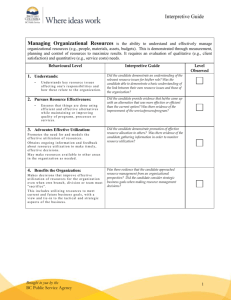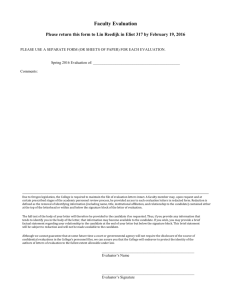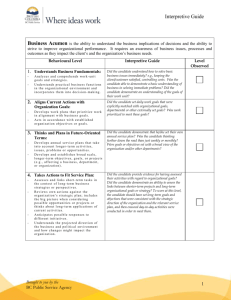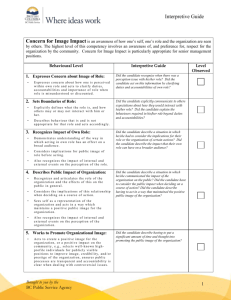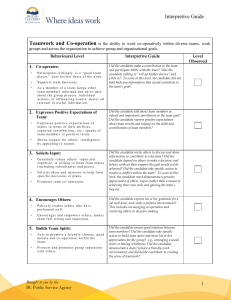Conceptual Thinking: Interpretive Guide & Levels
advertisement
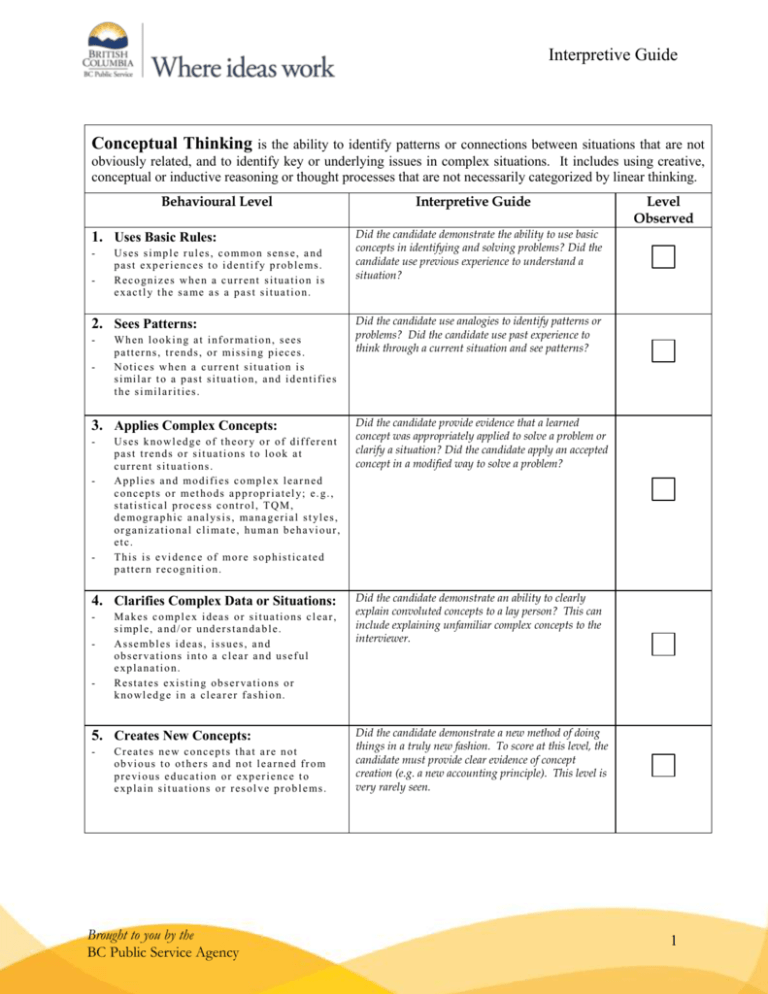
Interpretive Guide Conceptual Thinking is the ability to identify patterns or connections between situations that are not obviously related, and to identify key or underlying issues in complex situations. It includes using creative, conceptual or inductive reasoning or thought processes that are not necessarily categorized by linear thinking. Behavioural Level 1. Uses Basic Rules: - U s e s s i mp l e r u l e s , c o m m o n s e n s e , a n d p a s t e x p e r i e n c e s t o i d e n t i f y p r o b l e ms . Recognizes when a current situation is exactly the same as a past situation. 2. Sees Patterns: - W h e n l o o k i n g a t i n f o r ma t i o n , s e e s p a t t e r n s , t r e n d s , o r mi s s i n g p i e c e s . Notices when a current situation is s i mi l a r t o a p a s t s i t u a t i o n , a n d i d e n t i f i e s t h e s i mi l a r i t i e s . 3. Applies Complex Concepts: - - - Uses knowledge of theory or of different past trends or situations to look at current situations. A p p l i e s a n d m o d i f i e s c o mp l e x l e a r n e d c o n c e p t s o r m e t h o d s a p p r o p r i a t e l y; e . g . , statistical process control, TQM, d e m o g r a p h i c a n a l ys i s , ma n a g e r i a l s t yl e s , o r g a n i z a t i o n a l c l i ma t e , h u m a n b e h a vi o u r , etc. This is evidence of more sophisticated pattern recogniti on. 4. Clarifies Complex Data or Situations: - - M a k e s c o mp l e x i d e a s o r s i t u a t i o n s c l e a r , s i mp l e , a n d / o r u n d e r s t a n d a b l e . A s s e mb l e s i d e a s , i s s u e s , a n d observations into a clear and useful explanation. R e s t a t e s e x i s t i n g o b s e r va t i o n s o r knowledge in a clearer fashion. 5. Creates New Concepts: - Creates new concepts that are not o b vi o u s t o o t h e r s a n d n o t l e a r n e d f r o m p r e vi o u s e d u c a t i o n o r e x p e r i e n c e t o e x p l a i n s i t u a t i o n s o r r e s o l v e p r o b l e ms . Brought to you by the BC Public Service Agency Interpretive Guide Level Observed Did the candidate demonstrate the ability to use basic concepts in identifying and solving problems? Did the candidate use previous experience to understand a situation? Did the candidate use analogies to identify patterns or problems? Did the candidate use past experience to think through a current situation and see patterns? Did the candidate provide evidence that a learned concept was appropriately applied to solve a problem or clarify a situation? Did the candidate apply an accepted concept in a modified way to solve a problem? Did the candidate demonstrate an ability to clearly explain convoluted concepts to a lay person? This can include explaining unfamiliar complex concepts to the interviewer. Did the candidate demonstrate a new method of doing things in a truly new fashion. To score at this level, the candidate must provide clear evidence of concept creation (e.g. a new accounting principle). This level is very rarely seen. 1




